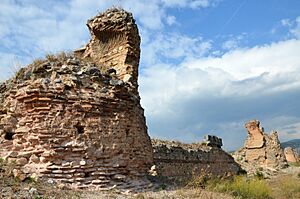Theodore II Laskaris facts for kids
Quick facts for kids Theodore II Doukas Laskaris |
|||||
|---|---|---|---|---|---|
| Emperor and Autocrat of the Romans | |||||
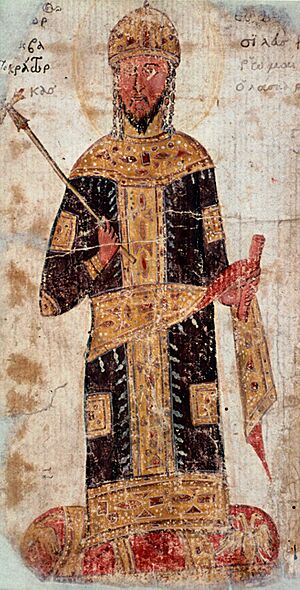
Miniature of Theodore II from the manuscript of Georgius Pachymeres' Historia, 14th century
|
|||||
| Emperor of Nicaea | |||||
| Reign | 4 November 1254 – 16 August 1258 |
||||
| Acclamation | 1235 as co-emperor | ||||
| Predecessor | John III Vatatzes | ||||
| Successor | John IV Laskaris | ||||
| Born | November 1221/1222 Nicaea |
||||
| Died | 16 August 1258 (aged 36/37) Magnesia |
||||
| Spouse | Elena of Bulgaria | ||||
| Issue more... |
Irene Doukaina Laskarina Eudoxia Laskarina John IV Laskaris |
||||
|
|||||
| House | Laskaris (matrilineal) Vatatzes (patrilineal) |
||||
| Father | John III Doukas Vatatzes | ||||
| Mother | Irene Laskarina | ||||
Theodore II Doukas Laskaris (born November 1221/1222 – died August 16, 1258) was the Emperor of Nicaea from 1254 to 1258. He was the only child of Emperor John III Doukas Vatatzes and Empress Irene Laskarina. His mother was the oldest daughter of Theodore I Laskaris. Theodore I had started the Empire of Nicaea. This was a new Greek state in Asia Minor after crusaders took Constantinople in 1204 during the Fourth Crusade.
Theodore received an excellent education from two famous teachers, Nikephoros Blemmydes and George Akropolites. He became friends with young, smart people, especially George Mouzalon. Theodore started writing about religion, history, and philosophy when he was young.
In 1235, Emperor John III arranged for Theodore to marry Elena of Bulgaria. This marriage created an alliance with Elena's father, Ivan Asen II, the Emperor of Bulgaria. They teamed up against the Latin Empire of Constantinople. Theodore said their marriage was happy, and they had five or six children. From 1241, Theodore helped his father rule Asia Minor. This was when his father was often away fighting in the Balkan Peninsula. Around 1242, he became his father's co-ruler, but he was not officially crowned. During this time, he had some disagreements with important nobles.
Theodore became emperor on November 4, 1254, after his father died. He removed many high-ranking officials and army leaders who were nobles. He replaced them with loyal friends, including some from ordinary families. In the same year, he made a defense agreement with Kaykaus II, the Seljuk Sultan of Rum. This was to protect against the Mongol Empire. In 1256, he stopped a Bulgarian invasion of Thrace and Macedonia. He also made Michael II Komnenos Doukas, the ruler of Epirus, give up Dyrrachium to Nicaea. He changed the army, bringing in more soldiers from local farmers in Asia Minor.
Later, Michael II of Epirus formed an alliance with Stefan Uroš I, King of Serbia, and Manfred of Sicily. They attacked Nicaea together. Theodore's new generals could not stop their invasion in 1257. Theodore became very ill and could not manage the government much in his last months. He chose George Mouzalon to be the regent for his young son, John IV. Theodore died on August 16, 1258, possibly from a long-term illness. Ten days later, nobles plotted against Mouzalon and killed him. Michael Palaiologos then took over as regent and soon became emperor himself.
Contents
Early Life and Education
Growing Up in Nicaea
Theodore was born in the imperial palace in Nicaea in late 1221 or early 1222. His parents were Emperor John III Doukas Vatatzes (who ruled from 1221 to 1254) and Irene Laskarina. Irene was the oldest daughter of Theodore I Laskaris (who ruled from 1205 to 1221). Theodore I founded the Empire of Nicaea. This empire was a new state that continued the Byzantine Empire. It was created after Catholic crusaders captured Constantinople in 1204.
Theodore was his parents' only child. His mother had a horse riding accident and could not have more children after he was born. He took his mother's family name, Laskaris. He was "raised as usual for a royal child," meaning he grew up in luxury in the palace. He remembered his childhood as happy and felt much comfort from his father. His parents did not punish him even when his tutor accused him of misbehaving.
Learning and Studying
Theodore likely started school around 1228, like most noble children in Nicaea. He learned parts of the Bible by heart and prayed three times a day. He could quote from the Psalms and parables of Jesus his whole life.
His secondary education began around 1230. He did not like his main tutor, calling him a "great babbler." He studied grammar (ancient Greek), poetry, public speaking, logic, math, astronomy, geometry, and music for three years. He loved studying words and their origins. Theodore was fascinated by the speeches of Demosthenes and Hermogenes of Tarsus. He also greatly admired the religious writer Gregory of Nazianzus. His tutor made fun of him for "philosophizing" and told him to focus more on military and diplomatic studies. Theodore was also a skilled hunter and polo player.
Talks about Theodore marrying Elena Asenina started after the Battle of Klokotnitsa. In this battle, Elena's father, Emperor Ivan Asen II of Bulgaria (who ruled from 1218 to 1241), defeated Theodore Komnenos Doukas. This battle weakened Epirus and made Bulgaria the strongest power in the Balkan Peninsula. Theodore and Elena's marriage in 1235 sealed their fathers' alliance against the Latin Empire of Constantinople. That same year, Bulgarian and Nicaean troops tried to capture Constantinople, but they failed. In 1237, Ivan Asen briefly allied with the Latins, but then returned to Nicaea's side. These changes made Theodore distrust Bulgarians for the rest of his life.
Theodore took philosophy classes from a very famous teacher, Nikephoros Blemmydes. Theodore attended his classes at Blemmydes' monastery near Nymphaion. Blemmydes' strong belief in Aristotelianism greatly influenced Theodore. Blemmydes was accused of stealing money in the 1240s. Although Emperor Vatatzes helped him avoid prison, he stopped teaching. Theodore continued to visit Blemmydes and write to him. A young scholar, George Akropolites, became Theodore's new main tutor. Akropolites, who was from Constantinople, taught Theodore logic and math. He also wrote a detailed history of the Empire of Nicaea.
Theodore's mother died in late 1239. His father, Vatatzes, remarried in 1240 to Constanza, the daughter of Frederick II, Holy Roman Emperor. She was about ten years old. Vatatzes also had a relationship with one of her Italian ladies-in-waiting.
Youth and Early Responsibilities
First Steps in Government
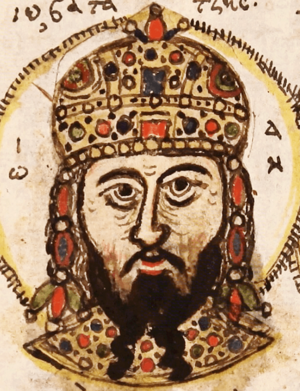
Theodore was likely made co-ruler when he was a child, following old traditions. The historian Akropolites mentioned Theodore as a co-emperor in 1235-1237 and in 1242. Theodore himself referred to his "imperial majesty" around 1242. He was not crowned while his father was alive.
Theodore had significant power. He could give out land and salaries, and he helped settle legal problems. When his father was away, he led meetings of the royal council. He also suggested people for open Church positions. For example, he ordered a bishop to return land to Blemmydes' monastery.
In May 1241, John III Vatatzes again tried to capture Constantinople. He soon realized he couldn't take the city. Theodore went with his father to peace talks with the Latin envoys. They signed a two-year truce on June 24. Ivan II Asen of Bulgaria died that same month, which weakened Bulgaria. Vatatzes then attacked Bulgaria's allies in Macedonia. Before leaving, he made Theodore his deputy in Asia Minor. Theodore traveled around Nicaean towns and villages, just like his father and grandfather.
At this time, a Mongol general, Baiju, invaded the Seljuk Sultanate of Rum, Nicaea's eastern neighbor. Theodore told his father, who was besieging Thessalonica. But Vatatzes did not stop his siege. His effort paid off when the ruler of Thessalonica gave up his title of emperor. The Mongols then attacked the Seljuks again and defeated them in 1243. The Seljuks agreed to pay tribute to the Mongols. Nicaea remained the only fully independent state in Anatolia. The fear of a Mongol invasion became a constant concern for Nicaean leaders.
Vatatzes again put Theodore in charge of Asia Minor when he started a new military campaign in Thrace in 1246. After Vatatzes captured Serres, the people of Thessalonica surrendered to him. Most towns in Macedonia followed their example. This almost doubled the size of Nicaea's empire.
Friends and Critics
Theodore became very close friends with a group of young, smart people. They were all born after Constantinople was taken by the Latins. They did not experience the shock of exile like many of their parents. His friends helped Theodore through times of sadness, likely caused by stress from his duties. His closest friend, George Mouzalon, was a page in his group when they were children. The three Mouzalon brothers—George, Theodore, and Andronikos—were from humble families, but they were talented singers and musicians. Most of Theodore's other close friends were related to high-ranking officials and church leaders.
His friends often teased Theodore about his way of thinking during philosophical talks. Their jokes bothered him. But criticism from bishops and nobles was more serious for his reputation. A bishop accused him of being too proud and not following fasting rules. The governor of Thessalonica, Theodore Philes, spread rumors about Theodore's supposed relationship with a woman. Theodore could not convince his old tutor, Blemmydes, that he was innocent. Theodore often made fun of bishops for being arrogant, speaking poorly, or having strange ideas.
Preparing to Rule Alone
Vatatzes was getting ready to attack Constantinople again in the spring of 1252. But the ruler of Epirus, Michael II Komnenos Doukas, invaded Nicaean land in Macedonia. Vatatzes made Theodore his deputy in Asia Minor and attacked Michael II, forcing him to return to Epirus.
Elena of Bulgaria, Theodore's wife, died suddenly before August 1252. Theodore mourned his wife for a long time. He only stopped fasting and wearing black when his father ordered him to. His wife's death made Theodore even sadder. He stayed in the palace, focusing on philosophy and writing. He only started visiting towns in Asia Minor again in 1253.
In early 1253, Emperor Frederick II's son, Conrad, forced most of his father's mistress's relatives into exile. They fled to Nicaea and sought help from Empress Constanza-Anna. Since his father was in Thrace, Theodore welcomed them. Conrad changed his mind and sent a scholar, Berthold of Hohenburg, to Nicaea to talk with them. While waiting for his father, Theodore had philosophical discussions with Hohenburg. Hohenburg asked Theodore for Greek philosophy books. This made Theodore proud of Greek history, and he decided to publish his own writings.
Vatatzes returned to Nicaea in late 1253. In early 1254, he became ill and never fully recovered. His illness made Theodore the actual ruler of the empire. Vatatzes was still alive when news of Mongol invasion plans reached Nicaea.
Theodore's Reign as Emperor
Becoming Emperor
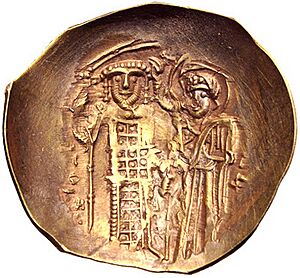
John III Vatatzes died in Nicaea on November 4, 1254. He left a strong empire to Theodore. Theodore was declared emperor, but he was not crowned because the patriarchal throne was empty. Theodore could not attack Constantinople because his empire was surrounded by enemies.
Theodore did not allow his father's widow, Anna-Constanza, to return to her home in Sicily. This angered her brother, Manfred, who had recently become powerful in Sicily. Theodore met with the Seljuk Sultan of Rum, Kaykaus II, in Philadelphia. They made a defense alliance against the Mongols.
Theodore wanted his old tutor, Blemmydes, to be the new patriarch, but he refused. His next choice, a hermit named Arsenios Autoreianos, accepted. The new patriarch crowned Theodore emperor on Christmas 1254. Theodore did not trust the nobles. He wrote about "unlawful love affairs and very unfair plots." Theodore made George Mouzalon the new commander-in-chief of the army. George's brother, Andronikos, became the commander of the imperial palace guards. Theodore also favored a general from a common family, Constantine Margarites. He gave jobs to some nobles who had been ignored by his father. He brought back his mother's uncles from exile and made two members of the Nestongos family generals. These choices offended most nobles.
Wars with Bulgaria
The young Bulgarian Tzar, Michael II Asen, used Vatatzes' death as a chance to take back lands Nicaea had seized. Michael invaded Macedonia and Thrace in late 1254 or early 1255. Most Nicaean forts had small armies, and local Bulgarians supported the invaders. The Bulgarians quickly took most Thracian forts. Two Macedonian towns also surrendered.
A quick war council agreed to attack immediately. Theodore decided to lead the campaign himself. He left Mouzalon in charge of Asia Minor in February 1255. Theodore's surprise attack forced the Bulgarians to leave Thrace. He ordered two Nicaean nobles to chase them. These generals retreated in a panic, abandoning their supplies. Theodore was furious and ordered them to come to his camp, but they disobeyed.
A Bulgarian who had joined Nicaea, Dragotas, switched sides and besieged Melnik. Theodore quickly went to help. The Bulgarians set an ambush, but he avoided it. Dragotas gave up the siege when Theodore arrived. From Melnik, Theodore went to Thessalonica and removed his old opponent, Philes, from being governor. Theodore closed the local mint. He wanted to create a central financial system in Asia Minor. He invaded Macedonia and made the Bulgarian army in Veles surrender. But a drought stopped him from continuing his campaign. He went to Serres and confirmed the tax benefits of Macedonian towns. He also arrested a bishop, believing he supported Michael II of Epirus.
A false report of a Mongol invasion made Theodore leave Macedonia in late 1255. After finding out the report was false, he attacked a fortress. He had to stop the campaign because his army could not cross the cold mountain passes. He returned to Anatolia around the end of the year. He gave honors and gifts to his trusted friends. He made Manuel Laskaris and Constantine Margarites commanders-in-chief in Thrace. He put George Mouzalon in charge of army reforms. At the same time, he acted against old noble families he did not trust. Two nobles who had offended him were blinded. Others were imprisoned. Theodore's cousin, Michael Palaiologos, fled to the Seljuks to avoid prison. Theodore used his power to arrange marriages between his favored commoners and old noble families.
Theodore decided to restart talks about uniting the Orthodox Nicaean and Catholic Churches with Pope Alexander IV. He sent envoys to Rome in 1256. Orthodox thinkers believed the Holy Spirit proceeded from the Father alone, while Catholics said it proceeded from the Father "and the Son". Theodore asked Blemmydes to explain the Orthodox view. Blemmydes suggested a compromise, but Theodore did not accept it. He stuck to the traditional Orthodox belief.
Michael II of Bulgaria sent raiders to plunder Thrace in early 1256. Theodore's generals were defeated. Theodore gathered a new army, partly from Anatolian farmers, and crossed the Hellespont. His troops defeated the enemy in two battles in Thrace. He began peace talks with Michael II. A treaty was drafted to restore the pre-war borders. The treaty said Michael II would give up a fortress to Nicaea. Theodore thought he had been tricked when the fortress was not given up right away. He ordered the public whipping of the historian Akropolites. But the Bulgarians gave up the fortress soon after. Theodore sent George Mouzalon to Akropolites to make up.
The peace treaty angered many in Bulgaria. Michael II's cousin took the throne, but he was soon killed. Other nobles claimed the throne. Most nobles preferred Konstantin Tih, even though he was not related to the ruling family.
Expanding the Empire
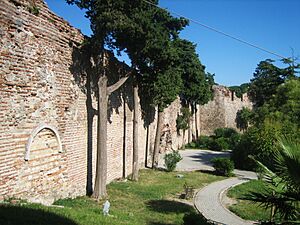
Theodore's war with Bulgaria brought Epirus and Serbia closer. Michael II of Epirus made an alliance with Stefan Uroš I, King of Serbia. He also sent gifts to Albanian chiefs to gain their support. Theodore's daughter, Maria, and Michael II's son, Nikephoros, were engaged during Vatatzes' reign. After making peace with the Bulgarians, Theodore ordered Michael II to send Nikephoros to Thessalonica to marry Maria. Nikephoros came with his mother. Theodore held her captive. He only let her return to Epirus after Michael II gave up two towns to him. Nicaea now controlled an important road. But Michael II remained hostile to Theodore.
Theodore met with a papal legate (a representative of the Pope) in Thessalonica. Their talks about church union and a new council of bishops failed. The legate could not make many compromises, and Theodore would not change his religious views. Theodore continued to write to the Pope but did not start new talks.
The Mongols invaded Asia Minor and defeated Kaykaus II in October 1256. Theodore quickly returned to Anatolia to prepare defenses. Kaykaus sought safety in Nicaea. The Mongols made Kaykaus' brother the new sultan. Theodore gathered his troops near Magnesia. The Mongol ruler sent a group to Theodore to discuss Kaykaus' future. The Mongols agreed to leave and divide the sultanate between the two brothers in 1257. Before leaving, Kaykaus gave four forts to Nicaea in exchange for 300 soldiers.
Theodore was confident after his successes. He proudly said his empire stretched from the Adriatic Sea to the Black Sea. His success against Bulgaria convinced him to recruit soldiers from Anatolian farmers. He wrote that local Greeks were more reliable than foreign soldiers.
Illness and Final Days
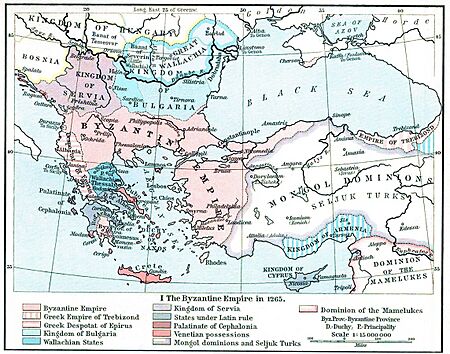
Theodore became very ill in November 1257. A historian named George Pachymeres, who was young at the time, said Theodore had epilepsy. He wrote that Theodore often lost consciousness and fell. Pachymeres also thought Theodore's strange decisions, like his unusual appointments and arranged marriages, were signs of his illness. Another historian, Akropolites, only noted that Theodore lost a lot of weight. Theodore himself wrote about terrible pain and paralysis in his arms. Modern historians disagree on his exact illness, but some believe he had epilepsy or brain cancer.
Theodore's illness stopped him from leading his troops in person. His new commanders in Macedonia, mostly from humble backgrounds, could not stop the Epirotes, Albanians, and Serbians from raiding Nicaean lands. Michael Palaiologos, who had been allowed to return from exile, led a new army to Macedonia. He defeated the Epirotes, but Theodore ordered him to return. This allowed Michael II to take a town and capture Akropolites, its governor. Michael II planned to attack Thessalonica. But Manfred of Sicily invaded Epirus from the west. Michael II allied with Manfred, who drove Nicaean forces from Dyrrachium and other forts by early 1258.
Konstantin Tih of Bulgaria divorced his first wife and asked to marry Theodore's oldest daughter, Irene. He knew that marrying Irene, who was the granddaughter of a Bulgarian Tzar, would strengthen his claim to the throne. Theodore wanted to confirm his peace with Bulgaria and accepted Konstantin Tih's offer. Irene went to Bulgaria to marry him.
Theodore rarely left his palace in Magnesia during his last months. He believed that magic caused his illness and accused his courtiers of casting spells on him. Many were put on trial. Michael Palaiologos's sister was a famous victim of Theodore's suspicions. Theodore also imprisoned Michael Palaiologos, but soon freed him.
The dying emperor named his seven-year-old son, John, as his only heir. He appointed George Mouzalon as regent until John was old enough to rule. Theodore became a monk, but kept his baptismal name. He wrote about his sins and asked for forgiveness. He died in the imperial palace at Magnesia on August 16, 1258. He was buried next to his father. His grave and the monastery were destroyed after the Turkish conquest in the 14th century.
The nobles had sworn loyalty to Mouzalon at Theodore's deathbed, but they soon plotted against him. Ten days later, Mouzalon was murdered. Michael Palaiologos took over as regent for the child-emperor, John IV Laskaris. Palaiologos convinced the nobles that an empire ruled by a boy could not defend itself. He was declared co-emperor as Michael VIII before the end of the year. When Michael VIII and John IV were crowned together in 1259, the Patriarch crowned Michael VIII first. Michael VIII then made an agreement with Genoa against the Latin Empire. He sent a general to spy on Constantinople's defenses. Taking advantage of most of the Latin army being away, the general captured Constantinople by surprise on July 25, 1261. Michael VIII was crowned alone in the Hagia Sophia. The child John IV was blinded on December 25, 1261, which meant he could not rule. To show that the Laskaris family had lost their imperial status, Michael VIII married John's three sisters to minor Italian and Bulgarian nobles.
Theodore's Writings
Theodore was a scholar who loved philosophy and religion. He made his court a center for famous scholars after he became emperor. He ordered that books collected by him and his father in city libraries be available to everyone. He started writing about philosophy, religion, and history during his father's lifetime. He decided to publish his works after meeting Berthold of Hohenburg in 1253. His writings were collected in four books, but only three survived.
Theodore's Satire of the Tutor, likely written in 1240, is his earliest surviving work. It makes fun of his main tutor, showing him as uneducated and rude. He also wrote praises for the people of Nicaea, his father, and Akropolites. Theodore's religious works, including his First Oration against the Latins and On the Trinity, show his strong belief in Orthodox theology. Theodore's Great Supplicatory Canon to Our Lady is his most famous work. He wrote it just months before he died, and it is still sung in Orthodox ceremonies today.
Family Life
Theodore and Elena were both younger than the legal marriage age when they married in early 1235. But such early marriages were common. Years later, Theodore described Elena as the "flower of his youth." He said their "bond of incomparable love" made them "happier than all people." They had four or five daughters and one son:
- Irene, who married Konstantin Tih of Bulgaria. She was a strong opponent of Emperor Michael VIII until her death around 1270.
- Maria, who married Nikephoros I of Epirus. She died between early 1257 and 1265.
- Theodora was married by Michael VIII to a nobleman from Morea.
- Eudoxia first married Count William-Peter of Ventimiglia, who died around 1280. Her second husband died in 1288. Eudoxia died in 1309.
- A Bulgarian noble, Jacob Svetoslav, married another of Theodore's daughters. She might have been Theodore's daughter born outside of marriage. Her name is not mentioned.
- Theodore's only son, John, spent the rest of his life in prison. He died around 1309.
| Theodore's family and his relationship to Byzantine imperial families | |||||||||||||||||||||||||||||||||||||||||||||||||||||||||||||||||||||||||||||||||||||||||||||||||||||||||||||||||||||||||||||||||||||||||||||||||||||||||||||||||||||||||||||||||||||||||||||||||||||||||||||||||||||||||||||||||||||||||||||||||||||||||||||||||||||||||||||||||||||||||||||||||||||||||||||||||||||||||||||||||||||||||||||||||||||||||||||||||||||||||||||||||||||||||||||||||||||||||||||||||||||||||||||||||||||||||||||||||||||||||||||||||||||||||||||||||||||||||||||||||||||||||||||||||||||||||||||||||||||||||||||||||||||||||||||||||||||||||||||||||||||||||||||||||||||||||||||||||||||||||||||||||||||||||||||||||||||||||||||||||||||||||||||||||||||||||||||||||||||||||||||||||||||||||||||||||||||||||||||||||||||||||||||||||||||||||||||||||||||||||||||||||||||||||||||||||||||||||||||||||||||||||||||||||||||||||||||||||||||||||||||||||||||||||||||||||||||||||||||||||||||||||||||||||||||||||||||||||||||||||||||||||||||||||||||||||||||||||||||||||||||||||||||||||||||||||||||||||||||||
|---|---|---|---|---|---|---|---|---|---|---|---|---|---|---|---|---|---|---|---|---|---|---|---|---|---|---|---|---|---|---|---|---|---|---|---|---|---|---|---|---|---|---|---|---|---|---|---|---|---|---|---|---|---|---|---|---|---|---|---|---|---|---|---|---|---|---|---|---|---|---|---|---|---|---|---|---|---|---|---|---|---|---|---|---|---|---|---|---|---|---|---|---|---|---|---|---|---|---|---|---|---|---|---|---|---|---|---|---|---|---|---|---|---|---|---|---|---|---|---|---|---|---|---|---|---|---|---|---|---|---|---|---|---|---|---|---|---|---|---|---|---|---|---|---|---|---|---|---|---|---|---|---|---|---|---|---|---|---|---|---|---|---|---|---|---|---|---|---|---|---|---|---|---|---|---|---|---|---|---|---|---|---|---|---|---|---|---|---|---|---|---|---|---|---|---|---|---|---|---|---|---|---|---|---|---|---|---|---|---|---|---|---|---|---|---|---|---|---|---|---|---|---|---|---|---|---|---|---|---|---|---|---|---|---|---|---|---|---|---|---|---|---|---|---|---|---|---|---|---|---|---|---|---|---|---|---|---|---|---|---|---|---|---|---|---|---|---|---|---|---|---|---|---|---|---|---|---|---|---|---|---|---|---|---|---|---|---|---|---|---|---|---|---|---|---|---|---|---|---|---|---|---|---|---|---|---|---|---|---|---|---|---|---|---|---|---|---|---|---|---|---|---|---|---|---|---|---|---|---|---|---|---|---|---|---|---|---|---|---|---|---|---|---|---|---|---|---|---|---|---|---|---|---|---|---|---|---|---|---|---|---|---|---|---|---|---|---|---|---|---|---|---|---|---|---|---|---|---|---|---|---|---|---|---|---|---|---|---|---|---|---|---|---|---|---|---|---|---|---|---|---|---|---|---|---|---|---|---|---|---|---|---|---|---|---|---|---|---|---|---|---|---|---|---|---|---|---|---|---|---|---|---|---|---|---|---|---|---|---|---|---|---|---|---|---|---|---|---|---|---|---|---|---|---|---|---|---|---|---|---|---|---|---|---|---|---|---|---|---|---|---|---|---|---|---|---|---|---|---|---|---|---|---|---|---|---|---|---|---|---|---|---|---|---|---|---|---|---|---|---|---|---|---|---|---|---|---|---|---|---|---|---|---|---|---|---|---|---|---|---|---|---|---|---|---|---|---|---|---|---|---|---|---|---|---|---|---|---|---|---|---|---|---|---|---|---|---|---|---|---|---|---|---|---|---|---|---|---|---|---|---|---|---|---|---|---|---|---|---|---|---|---|---|---|---|---|---|---|---|---|---|---|---|---|---|---|---|---|---|---|---|---|---|---|---|---|---|---|---|---|---|---|---|---|---|---|---|---|---|---|---|---|---|---|---|---|---|---|---|---|---|---|---|---|---|---|---|---|---|---|---|---|---|---|---|---|---|---|---|---|---|---|---|---|---|---|---|---|---|---|---|---|---|---|---|---|---|---|---|---|---|---|---|---|---|---|---|---|---|---|---|---|---|---|---|---|---|---|---|---|---|---|---|---|---|---|---|---|---|---|---|---|---|---|---|---|---|---|---|---|---|---|---|---|---|---|---|---|---|---|---|---|---|---|---|---|---|---|---|---|---|---|---|---|---|---|---|---|---|---|---|---|---|---|---|---|---|---|---|---|---|---|---|---|---|---|---|---|---|---|---|---|---|---|---|---|---|---|---|---|---|---|---|---|---|---|---|---|---|---|---|---|---|---|---|---|---|---|---|---|---|---|---|---|---|---|---|---|---|---|---|---|---|---|---|---|---|---|---|---|---|---|---|---|---|---|---|---|---|---|---|---|---|---|---|---|---|---|---|---|---|---|---|---|---|---|---|---|---|---|---|---|---|---|---|---|---|---|---|---|---|---|---|---|---|---|---|---|---|---|---|---|---|---|---|---|---|---|---|---|---|---|---|---|---|---|---|---|---|---|---|---|---|---|---|---|---|---|---|---|---|---|---|---|---|---|---|---|---|---|---|---|---|---|---|---|---|---|---|---|---|---|---|---|---|---|---|---|---|---|---|---|---|---|---|---|---|---|---|---|---|---|---|---|---|---|---|---|---|---|---|---|---|---|---|---|---|---|---|---|---|---|---|---|---|---|---|---|---|---|---|---|---|---|---|---|---|---|---|---|---|---|---|---|---|---|---|---|---|---|---|---|---|---|---|---|---|---|---|---|---|---|---|---|---|---|---|---|---|---|---|---|---|---|---|---|---|---|---|
|
|||||||||||||||||||||||||||||||||||||||||||||||||||||||||||||||||||||||||||||||||||||||||||||||||||||||||||||||||||||||||||||||||||||||||||||||||||||||||||||||||||||||||||||||||||||||||||||||||||||||||||||||||||||||||||||||||||||||||||||||||||||||||||||||||||||||||||||||||||||||||||||||||||||||||||||||||||||||||||||||||||||||||||||||||||||||||||||||||||||||||||||||||||||||||||||||||||||||||||||||||||||||||||||||||||||||||||||||||||||||||||||||||||||||||||||||||||||||||||||||||||||||||||||||||||||||||||||||||||||||||||||||||||||||||||||||||||||||||||||||||||||||||||||||||||||||||||||||||||||||||||||||||||||||||||||||||||||||||||||||||||||||||||||||||||||||||||||||||||||||||||||||||||||||||||||||||||||||||||||||||||||||||||||||||||||||||||||||||||||||||||||||||||||||||||||||||||||||||||||||||||||||||||||||||||||||||||||||||||||||||||||||||||||||||||||||||||||||||||||||||||||||||||||||||||||||||||||||||||||||||||||||||||||||||||||||||||||||||||||||||||||||||||||||||||||||||||||||||||||||
See also
 In Spanish: Teodoro II Láscaris para niños
In Spanish: Teodoro II Láscaris para niños
 | James Van Der Zee |
 | Alma Thomas |
 | Ellis Wilson |
 | Margaret Taylor-Burroughs |


